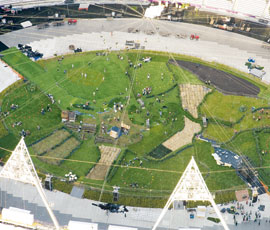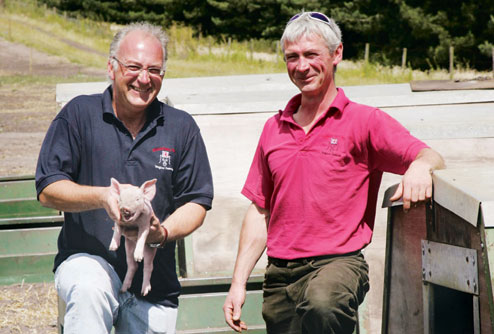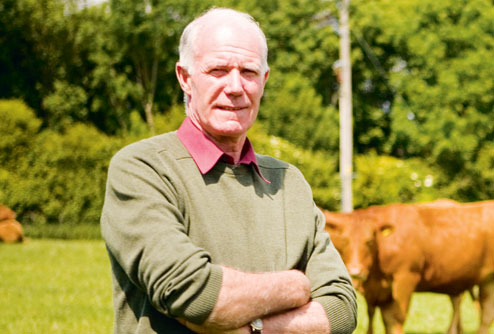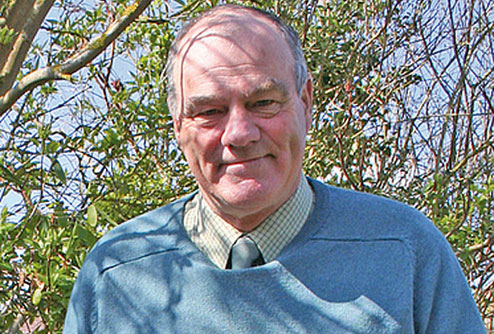Farmers delivering Olympian food

The public focus may have been on the venues, world records and security, but food is a major issue at the London 2012 Olympic Games. Bronagh Miskelly reports.
Feeding the London 2012 Olympics is the biggest peacetime catering operation.
The Olympic Village is expected to use 25,000 loaves of bread, 31 tonnes of poultry, 75,000 litres of milk and 19 tonnes of eggs.
In its “Food Vision”, the London Organising Committee of the Olympic Games (Locog) set out ambitious targets about sustainability, food traceability and labelling. Key aims included sourcing from smaller scale, British, regional and local enterprises, and high welfare standards.
The legacy theme of London 2012 also applies to food, with Locog calling for the standards used at the Games to be taken up by the catering industry as a whole.
Achieving this during a few weeks of sports events sounds like a tall order, but organisations involved in the vision believe it is possible – and worth striving for.
“The Olympics actually offered a sizeable market opportunity,” says Lee Woodger, the NFU’s head of food chain. “But at the beginning of the process there were a number of competing issues and interests – for example, a target of a fully organic Games would have resulted in more food being imported to the UK and British farmers missing out.
“The vision addressed this with the commitment to local sourcing and the Red Tractor standard. Food standards like these have never been enforced on this scale before and it means there is now no excuse for other events or organisations.”
“This about a can-do attitude,” he says.
Mark and Paul Hayward
Dingly Dell Pork, Woodbridge, Suffolk
Brothers Mark and Paul Hayward will be supplying their Suffolk pork to London 2012 and have been awarded a particular honour. “We are only one of two food brands allowed to talk about our involvement in the Olympics – our pork is named on the menus,” says Mark Hayward.
“We started talking to Locog and its contractors last May. We were already working with Food Services London, but this has given us an opportunity to strengthen our relationships in the supply chain.” He hopes to see long-term opportunities develop from the Olympic project and it has certainly been great publicity for the brand.
The brothers had to put extra production in place for this summer but believe the opportunity has been worth the effort.

John Hoskin
Beef supplier to McDonald’s Olympic restaurants
“There two issues about supplying the Olympics. Does it make a difference financially – well I certainly hope people eat lots of beefburgers from McDonald’s at the Olympic Park. But then there is feeling proud to be supplying the Olympics when it is happening in our own country,” says Mr Hoskin.
He says it has been a good step for building a relationship with McDonald’s and the understanding the global giant has about his operation. Plus there has been an unexpected bonus. “They have sent us tickets to the cycling at the velodrome,” says a clearly enthusiastic Mr Hoskin.

William Emmett
Hornbuckle Farm, Berkshire
Hornbuckle Farm was already a direct supplier to Haygates when the family-run miller in the Midlands approached it to provide wheat for the London 2012 supply chain. Haygates was in turn approved by Red Tractor as part of the effort to ensure as much of the Olympic bread as possible is made from UK supplies.
“Wheat from our 2011 harvest is being used to make the bread for the athletes. That was the highest-quality harvest ever, so the athletes will have top-quality bread,” says Mr Emmett, who has an unusually close relationship to the Olympics. The farm is close to the Eton Park rowing lake and his daughter and son-in-law have sheep grazing close to the venue.
“I’m hoping to don my shepherd’s smock on the days there are events on the water – but that depends on the security.” And he admits the harvest is likely to be more pressing than cheering on athletes.

- 14 million meals
- 25,000 loaves of bread
- 232 tonnes of potatoes
- 82 tonnes of seafood
- 31 tonnes of poultry items
- 100 tonnes of meat
- 75,000 litres of milk
- 19 tonnes of eggs
- 21 tonnes of cheese
- 330 tonnes of fruit/vegetables
- McDonald’s will use 60,000 heads of lettuce in the Olympic Park
- McDonald’s has committed to serve British chicken through its four branches, which will provide 9.8% of food at the Olympic Park
- Eggs to be British, Lion-mark and free-range
Subscribe to Farmers Weekly
A fuller version of this story appeared in the 27 July edition of Farmers Weekly. Subscribe to the magazine.
